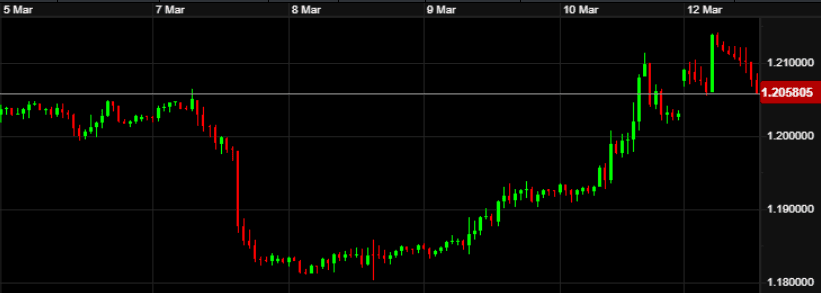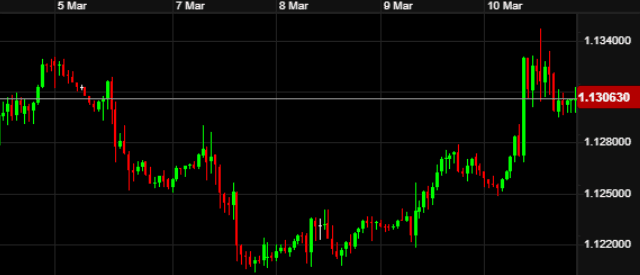ACM Update 13-03-23

All eyes are currently on the US, for a multitude of reasons. Fed Chair Jerome Powell caused further Dollar volatility, Non-Farm Payrolls continue to beat expectations, before Silicon Valley Bank stole financial headlines for all the wrong reasons.
This week the fallout from SVB has the potential to continue to spook the US, before we hear the latest on American inflation, the ECB’s ongoing monetary policy and Jeremy Hunt outlines his UK budget.
An incredibly volatile week for the US Dollar last week, with moves of over 1.5% against the other majors (in both directions) at times. As I have mentioned for some time now, all eyes globally have been on the moves of the Fed and how best to react to their monetary policy changes. Other central banks have been in a dilemma of hiking too little and importing US inflation, or hiking too much and stalling their own respective economies.
Given the disinflationary trend (falling inflation) the US economy is now in, the Federal Reserve had been expected by many to have stopped their rate hikes and be heading towards their “pivot point”. This being the point at which they look to cut their headline interest rate, to avoid causing further damage to the overall economy.
Chair, Jerome Powell, had two stints in front of the Senate and House banking committees last week, with the former on Tuesday causing the most market movement. With all the latest US data at his disposal, his comments were taken seriously by markets:
“The latest economic data have come in stronger than expected, which suggests that the ultimate level of interest rates is likely to be higher than previously anticipated”
Whilst not exactly a ground-breaking comment, this was enough to restore faith in a Dollar which has been in a state of flux over the course of the last month or so, as investors awaited more clarity on said pivot point. For now, we can expect to see more rate hikes to come, with the next Fed meeting just nine days away.
Powell’s comments gave (at the time) renewed confidence and saw a gain of 1.5% for the USD against its peers. This saw GBP-USD break out of the recent 1.20 to 1.25 range, and down to a low of just above 1.18, last seen in mid-November.
Arguably the biggest piece of US data for the month was released on Friday afternoon, in the form of the Non-Farm Payrolls. This indicates the number of jobs added to the US economy in the previous calendar month, and heavily indicates overall economic growth. The figure came in above expectations (for the 11th month in a row) at 311k jobs added. However the Unemployment data released alongside, showed unemployment had risen to 3.6%, up from 3.4% the previous month. Powell and his fellow committee members will need to watch the imbalance between these two pieces of data closely when determining policy.
Later in the week, it was revealed that US regulators had shut down and taken control of customer deposits in Silicon Valley Bank. The 16th largest bank in the US, its troubles have snowballed in recent days after “inadequate liquidity and insolvency” forced Californian regulators to step in. Ironically, the funding issue seems to have stemmed from the recent moves higher in interest rates, impacting the price of US Government bonds.
Bank shares globally had a tough day as result on Thursday and early Friday, and it will be interesting to see how the Dollar and overall banking sector fares this coming week. Moves on GBP-USD can be seen in the chart below.

UK economic data for January was released last week in the form of GDP numbers. Somewhat surprisingly, these showed a gain of 0.3% for the month, bouncing back from the drop of -0.5% in December. The expectation for the January number was a growth of 0.1%, so this albeit small gain was seen as a real positive for the Pound.
In contrast though, the NIESR (National Institute of Economic and Social Research) don’t see the current economic picture to be quite as rosy. They released their own estimate for the performance of the UK economy in the last three rolling months (Dec-Feb), which suggested a figure of -0.1%. Either way, the UK economy is dangerously close to being in recession territory.
On Wednesday this week, we will get to find out what new Chancellor Jeremy Hunt plans to do about the state of the economy, in his budget. This should be a smoother ride though than the Truss-Kwarteng effort in September though, despite taking place on the same day as multiple planned strikes across the country…
In the Eurozone….. well there wasn’t a huge amount happening last week frankly. Rishi Sunak seems to be rebuilding Anglo-French relations with his counterpart Emmanuel Macron, as the two look to solve the small boats issue. Meanwhile, Christine Lagarde maintains that the case for a 50 basis point hike in Eurozone interest rates this month is still on the cards. That we shall discover one way or another on Thursday in the latest ECB meeting.
Overall, Sterling-Euro wasn’t quite as volatile as other pairs, remaining within roughly a 1% range for the week as shown in the chart below:

Elsewhere:
- Australian interest rates went up 0.25% to 3.6%, with the RBA pushing them to their highest since May 2012.
- In Canada, the Bank of Canada kept interest rates on hold as expected at 4.5%.
- The Bank of Japan did the same, holding at -0.1%.
The week ahead:
Tuesday – UK Unemployment & Claimant Count data (07:00 UK time), US CPI inflation (12:30)
Wednesday – Chancellor Jeremy Hunt’s UK budget (12:30), US Retail Sales & PPI inflation (12:30)
Thursday – Australian Unemployment (00:30), ECB interest rate announcement (13:15) & Christine Lagarde Press Conference (13:45)
Friday – Eurozone Final CPI inflation YoY (10:00)
So not a massive number of events, but those released this week are of major significance. Whilst economic data releases are of most focus, the Dollar can expect to be driven by the handling of the Silicon Valley Bank situation by US regulators, not to mention any potential knock-on effects. Emergency measures have already taken place over the weekend in the US to protect deposits.
The Dollar has weakened off from the position it was in mid last week, so for now we are likely to see a slightly weaker USD than at times last week. Any clients with requirements to buy USD, we may have a good opportunity to do so this week at beneficial levels.
The big day for the UK will be Wednesday with Jeremy Hunt’s budget in the House of Commons. Expect some volatility surrounding this dependent on narrative. Meanwhile on the continent, the ECB’s interest rate meeting is likely to deliver another 50 basis point rate hike. Anything other than this could cause a stir for the Euro.
All in all, plenty of potential for a volatile week. Make sure to reach out to the team with any pending requirements.
Have a great week.